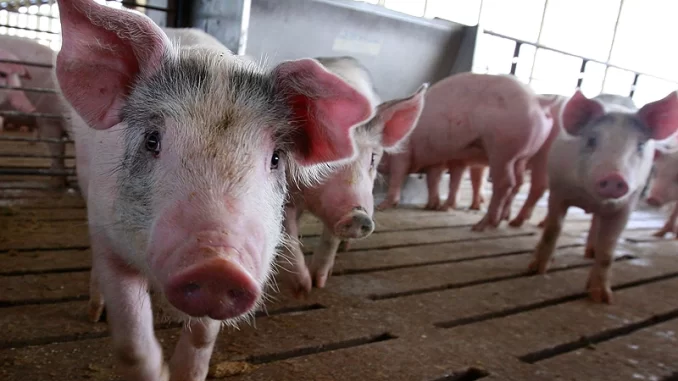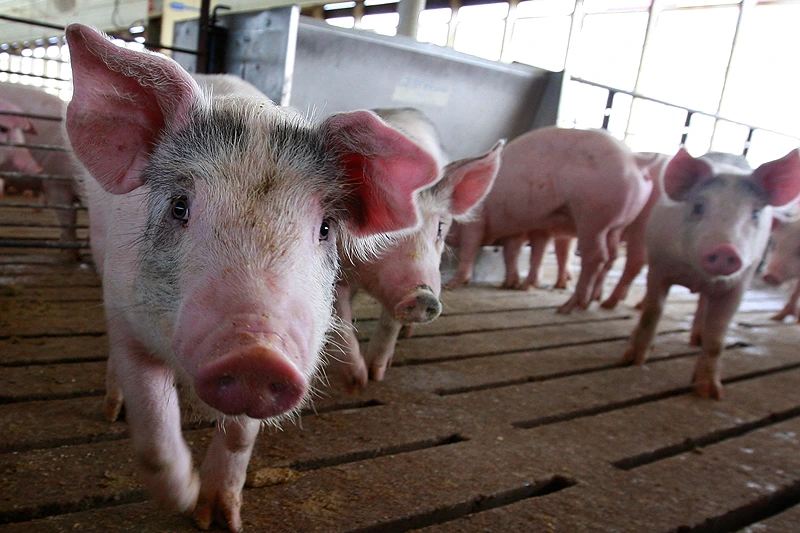

OAN Brooke Mallory
UPDATED 11:58 AM – Thursday, May 11, 2023
A California animal welfare law that forbids the sale of pork from breeding pigs kept in cramped quarters has been rejected by the Supreme Court on Thursday.
Advertisement
The majority of the court, divided along non-ideological lines, said that the proposition known as “Proposition 12” did not, contrary to what challengers claimed, illegally regulate pork produced in other states.
As a result of separate litigation in state court, the legislation is currently on hold.
There was significant disagreement over the preferable legal justification to use, as seen by the fact that five separate justices wrote down their individual views. Four justices disagreed with the other five, who felt the lawsuit should have been allowed to proceed instead of being dismissed.
The decision, which was written by Justice Neil Gorsuch, upheld states’ rights to pass laws that safeguarded the public’s health and welfare, even if such laws had an effect elsewhere. The power of states to implement legislation on a wide variety of topics, including measures aimed at tackling climate change, such as initiatives to lessen reliance on fossil fuels by boosting renewable energy, could be restricted.
“While the Constitution addresses many weighty issues, the type of pork chops California merchants may sell is not on that list,” Gorsuch said.
The California statute concentrated on controlling the sale of pork within its own borders, despite the fact that it had long been recognized that states could not use their laws to discriminate against out-of-state interests, according to Justice Gorsuch.
“We are very disappointed with the Supreme Court’s opinion. Allowing state overreach will increase prices for consumers and drive small farms out of business, leading to more consolidation,” said Scott Hays, president of the National Pork Producers Council.
Proposition 12 was passed by Californians with nearly 63% of the vote in 2018, a margin of more than 3 million votes. Female pigs would need to have at least 24 square feet of room in their enclosures so they would be able to move easier and turn around, according to the rule.
In court documents, the state’s attorneys said that voters had been informed that the initiative, which is not already in effect, would most likely raise the price of pork while ensuring more humane living conditions for pigs, possibly lowering the risk of foodborne illnesses.
The American Farm Bureau Federation and the National Pork Producers Council, which represent the farming and pork industries, filed a lawsuit in 2019 alleging that the proposed rule violates the Constitution’s commerce clause, which has been interpreted as prohibiting states from interfering with interstate commerce.
The majority of all pork marketed in California has been produced outside of the state by farmers who would not currently be in compliance, according to the challengers, who claimed that the bill would impermissibly interfere with interstate commerce. In addition, they maintained that the rule would penalize out-of-state organizations excessively without clearly benefiting the state. As a result, the law has an illegally extensive extraterritorial impact.
The opponents then turned to the Supreme Court, which holds a 6-3 Conservative majority, after lower courts supported the law.
Republicans Clarence Thomas and Amy Coney Barrett, as well as Democrats Elena Kagan and Sonia Sotomayor, joined Gorsuch in the majority. Chief Justice John Roberts, whose opinion differed, claimed that the action should have been reopened since the challenges “have plausibly alleged a substantial burden against interstate commerce.”
Along with Democrat Justice Ketanji Brown Jackson, Republicans Samuel Alito and Brett Kavanaugh also voiced their disagreement.
According to the attorneys for the Humane Society of the United States, several states had passed such legislation due to moral objections, including nine that forbade products tested on animals and eight that forbade eggs produced by caged hens. According to court documents, nine states also prohibited the sale of fetal tissue from aborted fetuses, which has been utilized more often than the average consumer is aware of.
The parties who opposed the California law said that Proposition 12 “will transform the pork industry nationwide” because the majority of farmers now confine female pigs to pens that are in violation of the law.
California and its allies disagreed, and one of their allies, the pork company Perdue Premium Pork Co., claimed in a brief submitted in court that its’ Niman Ranch brand had been breeding hogs for years that would comply with Proposition 12’s standards.
Rob Bonta, the attorney general of California, claimed in court documents that the measure was legal under the commerce clause since it did not favor California producers over competitors from other states.
The Biden administration has supported the plaintiffs in the lawsuit, with Solicitor General Elizabeth Prelogar asserting that Proposition 12 irrationally restricts interstate commerce, in part because it regulates the welfare of animals outside state borders.
She claimed that because the law’s health benefits have not been proven, the stated benefits fall short of supporting its broad scope.
Stay informed! Receive breaking news blasts directly to your inbox for free. Subscribe here. https://www.oann.com/alerts

Be the first to comment